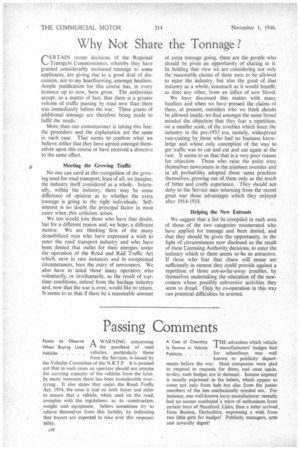Why Not Share the Tonnage.?
Page 20

If you've noticed an error in this article please click here to report it so we can fix it.
r'ERTAIN recent decisions of the Regional Transport Commissioners, whereby they have granted considerably increased tonnage to some applicants, are giving rise to a good deal of discussion, not to say heartburning, amongst hauliers. Ample justification for this course has, in every instance up to now, been given. The authorities accept, as a matter of fact, that there is a greater volume of traffic passing by road now than there was immediately before the war. These grants of additional tonnage are therefore being made to fulfil the needs.
More than one commissioner is taking this line: the procedure and' the explanation are the same in each case. That seems to confirm what we believe, either that they have agreed amongst themselves upon this course or have received a directive to the same effect.
Meeting the Growing Traffic No one can cavil at this recognition of the growing need for road transport, least of all, we imagine. the industry itself considered as a whole. Internally, within the industry, there may be some difference of opinion as to whether the extra tonnage is going to the right individuals. Selfinterest is no doubt the principal factor in most cases when this criticism arises.
We too would join those who have that doubt. but for a different reason and, we hope, a different motive. We are thinking first of the many demobilized men who have expressed a wish to enter the road transport industry and who have been denied that outlet for their energies under the operation of the Road and Rail Traffic Act which, save in rare instances and in exceptional circumstances, bars the entry of newcomers. We also have in mind those many operators who voluntarily, or involuntarily, as the result of wartime conditions, retired from the haulage industry and, now that the war is over, would like to return. It seems to us that if there be a reasonable amount of extra tonnage going, these are the people who should be given an opportunity of sharing in it. In holding that view we are considering not only the reasonable claims of these men to be allowed to enter the industry, but also the good of that industry as a whole, inasmuch as it would benefit, as does any other, from an influx of new blood.
We have discussed this matter with many hauliers and when we have pressed the claims of these, at present, outsiders who we think should be allowed inside, we find amongst the more broad minded the objection that they fear a repetition. on a smaller scale, of the troubles which beset the industry in the pre-1933 era, namely, widespread rate-cutting by those who had no business knowledge and whose only conception of the way to get traffic was to cut and cut and cut again at the rate. It seems to us that that is a very poor reason for objection. Those who raise the point were themselves newcomers in the nineteen twenties and in all probability adopted those same practices themselves, growing out of them only as the result of bitter and costly experience. They should not deny to the Service men returning from the recent great war those advantages which they enjoyed after 1914-1918.
Helping the New Entrants We suggest that a list be compiled in each area of those of the two categories enumerated who have applied for tonnage and been denied, and that they should be given the opportunity, in the light of circumstances now disclosed as the result of these Licensing Authority decisions, to enter the industry which to them seems to-be so attractive. If those who fear that chaos will ensue are sufficiently in earnest they could provide against a repetition of those not-so-far-away troubles, by themselves undertaking the education of the newcomers whose possibly subversive activities they seem to dread. Only by co-operation in this way can potential difficulties be averted.




































































